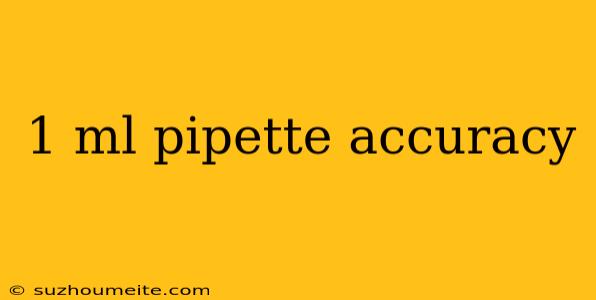1 mL Pipette Accuracy: Understanding the Importance of Precision
Introduction
In laboratory settings, precision is paramount. One of the most critical tools in ensuring accurate results is the pipette. Among various types of pipettes, the 1 mL pipette is a crucial instrument in many scientific applications. However, the accuracy of a 1 mL pipette can significantly impact the reliability of experimental results. In this article, we will delve into the importance of 1 mL pipette accuracy and its implications on scientific research.
What Affects Pipette Accuracy?
Several factors can influence the accuracy of a 1 mL pipette, including:
Manufacturing Tolerances
Pipettes are manufactured to certain specifications, and small variations in production can lead to deviations from the expected volume.
Operator Error
Human error can occur when handling the pipette, such as incorrect pipetting technique or misreading the meniscus.
Environmental Factors
Temperature, humidity, and air pressure can affect the accuracy of pipette measurements.
Consequences of Inaccurate Pipetting
Inaccurate pipetting can have significant consequences, including:
Contamination Risks
Inaccurate volumes can lead to contamination risks, compromising the integrity of experimental results.
Inconsistent Results
Inconsistent volumes can result in inconsistent results, making it challenging to replicate experiments.
Waste of Resources
Inaccurate pipetting can lead to wasted resources, including time, money, and materials.
Ensuring 1 mL Pipette Accuracy
To ensure the accuracy of a 1 mL pipette, laboratories can take the following measures:
Regular Calibration
Regularly calibrate pipettes to ensure they are functioning within the specified tolerance.
Proper Training
Provide operators with proper training on pipetting techniques and instrument handling.
Environmental Control
Maintain a controlled environment to minimize the impact of environmental factors on pipette accuracy.
Conclusion
The accuracy of a 1 mL pipette is crucial in ensuring the reliability of scientific results. By understanding the factors that affect pipette accuracy and taking measures to ensure precision, laboratories can minimize errors and ensure accurate results. Remember, precision matters in scientific research, and a 1 mL pipette is no exception.
